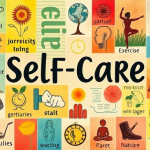
Nurture Yourself: Secrets to Practicing Mindful Self-Care Every Day
Identifying Your Needs

Identifying your needs is a crucial step in taking care of yourself. It involves tuning in to your thoughts, feelings, and physical sensations to understand what you require for your overall well-being. By actively listening to your body and mind, you can pinpoint areas that may need attention or nurturing.
Taking the time to identify your needs allows you to prioritize what matters most to you and allocate your energy accordingly. Whether it’s recognizing the need for rest, social connection, or personal growth, being aware of your needs empowers you to make decisions that support your health and happiness.
Setting Boundaries
Setting boundaries is a crucial aspect of self-care that allows you to protect your well-being and maintain healthy relationships. By clearly defining what is and isn’t acceptable in your interactions with others, you establish a sense of control over your time, energy, and emotions. Setting boundaries is not about being selfish or confrontational, but rather about advocating for your own needs and respecting your personal limits.
When setting boundaries, it’s important to communicate them assertively and confidently. This means expressing your limits in a direct and respectful manner, without feeling the need to justify or apologize for them. Remember that boundaries are there to safeguard your mental and emotional health, and it’s okay to prioritize your own well-being above others’ expectations.
Practicing Gratitude
Expressing gratitude is a simple yet powerful practice that can significantly enhance our overall well-being. Taking a few moments each day to reflect on the things we are thankful for can help shift our focus from what’s lacking in our lives to the abundance that surrounds us. It can foster a sense of contentment and appreciation for the present moment, leading to increased levels of happiness and satisfaction.
When we make gratitude a regular part of our daily routine, we train our minds to notice the positive aspects of our lives, no matter how small they may seem. This shift in perspective can have a profound impact on our mental and emotional health, reducing stress and anxiety while promoting a more optimistic outlook on life. By acknowledging and being grateful for the good things in our lives, we cultivate a mindset of abundance and positivity that can enrich our overall quality of life.
Engaging in Physical Activity
Physical activity is essential for maintaining overall health and well-being. Engaging in regular exercise not only helps to improve physical fitness but also promotes mental clarity and emotional balance. Whether it’s going for a brisk walk, hitting the gym, or practicing yoga, finding a form of physical activity that resonates with you is key to incorporating it into your daily routine.
Consistency is key when it comes to reaping the benefits of physical activity. Setting realistic goals and gradually increasing the intensity of your workouts can help you stay motivated and committed to your fitness regimen. Remember, it’s not about perfection but about making a conscious effort to prioritize your physical health and make time for exercise in your busy schedule.
Meditating or Practicing Mindfulness
Incorporating moments of quiet reflection into your daily routine can have a profound impact on your overall well-being. Taking even just a few minutes each day to sit in stillness, focus on your breath, and be present in the moment can help to reduce stress and increase feelings of calmness. Mindfulness practice teaches us to observe our thoughts and emotions without judgment, allowing us to cultivate a greater sense of self-awareness and emotional regulation.
By cultivating a regular meditation practice, you can learn to better manage challenging situations with grace and clarity. Mindfulness allows us to tune into our bodies and minds, helping us to recognize when we may be feeling overwhelmed or anxious. This self-awareness can empower us to respond to stressors in a healthier way, fostering a greater sense of resilience and inner peace.
Eating Nutritious Foods

When it comes to nurturing our overall well-being, the importance of eating nutritious foods cannot be overstated. Our diet plays a fundamental role in fueling our bodies and minds, impacting our energy levels, mood, and overall health. Consuming a balanced diet rich in fruits, vegetables, whole grains, lean proteins, and healthy fats provides our bodies with the essential nutrients they need to function optimally.
Integrating nutritious foods into our daily meals not only supports our physical health but also contributes to our mental clarity and emotional stability. By choosing whole, unprocessed foods and incorporating a variety of colors and nutrients into our diet, we can enhance our immune system, improve our digestion, and boost our vitality. Remember, food is not just fuel; it is a form of self-care and self-love that can nourish us from the inside out.
Getting Adequate Sleep
Getting adequate sleep is crucial for overall well-being and optimal functioning. Quality sleep is essential for our physical health, cognitive abilities, and emotional stability. When we prioritize adequate sleep, we allow our bodies to rest, recharge, and repair, leading to improved energy levels and mood regulation.
Lack of sufficient sleep can result in a range of negative consequences, including decreased concentration, impaired decision-making, and weakened immune function. It can also contribute to heightened stress levels and an increased risk of developing chronic health conditions. By ensuring we get the recommended amount of sleep each night, we can support our bodies in performing at their best and enhance our overall quality of life.
• Getting adequate sleep is crucial for overall well-being and optimal functioning.
• Quality sleep is essential for our physical health, cognitive abilities, and emotional stability.
• Prioritizing adequate sleep allows our bodies to rest, recharge, and repair.
• Adequate sleep leads to improved energy levels and mood regulation.
Lack of sufficient sleep can result in a range of negative consequences:
• Decreased concentration
• Impaired decision-making
• Weakened immune function
• Heightened stress levels
• Increased risk of developing chronic health conditions
By ensuring we get the recommended amount of sleep each night:
• Support our bodies in performing at their best
• Enhance our overall quality of life.
Limiting Screen Time
Limiting screen time can have a significant impact on our overall well-being. Excessive use of screens, whether it be smartphones, computers, or televisions, can lead to eye strain, poor posture, disrupted sleep patterns, and decreased physical activity. It is important to set boundaries around screen time to ensure that we are not overly reliant on technology for our entertainment and connection with others.
In today’s digital age, it can be challenging to disconnect from screens, but it is essential for our mental and physical health. By reducing screen time, we can create more opportunities for meaningful interactions with loved ones, engage in hobbies or creative activities, and spend time outdoors. Setting limits on screen time can help us cultivate a healthier relationship with technology and prioritize self-care in our daily lives.
Connecting with Nature
Spending time in nature can have a profound impact on our overall well-being. Whether it’s a walk in the park, a hike in the mountains, or simply sitting by a body of water, connecting with the natural world can help us feel more grounded and at peace. Being surrounded by greenery and fresh air can provide a much-needed break from the hustle and bustle of daily life, allowing us to recharge and rejuvenate our mind, body, and spirit.
Nature has a way of calming our minds and soothing our souls. The sounds of birds chirping, leaves rustling in the wind, and water flowing can help quiet the noise of our busy minds and bring a sense of tranquility. With its beauty and serenity, nature reminds us to slow down, be present in the moment, and appreciate the simple wonders that surround us. Whether it’s a sunny day or a rainy afternoon, connecting with nature can be a powerful remedy for stress, anxiety, and overall mental well-being.
Pursuing Hobbies or Creative Activities
Engaging in hobbies or creative activities can be a fulfilling way to unwind and decompress after a long day. These activities allow you to tap into your creativity and express yourself in a unique and enjoyable manner. Whether it’s painting, knitting, gardening, or playing a musical instrument, finding a hobby that brings you joy can enhance your overall well-being.
Incorporating hobbies or creative pursuits into your routine can also provide a sense of accomplishment and boost your self-esteem. By devoting time to activities that you are passionate about, you are giving yourself the opportunity to recharge and indulge in something that brings you personal satisfaction. So, don’t underestimate the power of hobbies in nurturing your mental and emotional health.
Journaling or Reflecting

One effective way to enhance self-awareness and promote emotional well-being is through the practice of journaling or reflecting regularly. By putting your thoughts and feelings onto paper, you can gain clarity on various aspects of your life and identify patterns that may be influencing your mood and behaviors. Writing down your experiences can provide a sense of release and help you process and make sense of complex emotions that you may be experiencing.
Additionally, engaging in reflective writing allows you to track your progress and growth over time. Looking back on past journal entries can offer insights into how far you have come and what areas you may still need to work on. It serves as a reminder of your journey and can be a source of motivation to continue prioritizing self-care and personal development.
Scheduling Regular “Me Time”
It’s crucial to carve out dedicated time in your schedule for yourself. Regularly setting aside “me time” allows you to recharge and focus on self-care. Whether it’s reading a book, taking a bath, going for a walk, or simply sitting in silence, this time is yours to unwind and reset.
By prioritizing regular “me time,” you can prevent burnout and maintain a healthy work-life balance. Taking care of your own needs is not selfish, but rather a necessary practice to ensure your overall well-being. Remember, you deserve to treat yourself with kindness and respect, and scheduling regular “me time” is a powerful way to do just that.
Seeking Support from Others
Sometimes, we all need a helping hand to navigate through life’s challenges. Seeking support from others can provide a sense of relief and comfort knowing that you’re not alone in facing difficulties. Whether it’s talking to a trusted friend, confiding in a family member, or seeking professional help, reaching out to others can offer valuable perspectives and emotional support that may help lighten the load you’re carrying.
In times of distress or uncertainty, building a support network can be a source of strength and resilience. By fostering connections with individuals who genuinely care about your well-being, you create a safety net of understanding and empathy. Being open to accepting support from others not only promotes mental and emotional well-being but also fosters a sense of community and belonging, reinforcing the idea that it’s okay to lean on others during challenging times.
Learning to Say No
Learning to say no can be a powerful act of self-care. It involves setting boundaries and prioritizing your own well-being. By learning to decline requests or opportunities that don’t align with your values or goals, you create space for the things that truly matter to you. Saying no can also prevent burnout and feelings of overwhelm, allowing you to focus on activities that bring you joy and fulfillment. It’s important to remember that saying no is not selfish; it’s a necessary step towards protecting your mental and emotional health.
When practicing saying no, it’s helpful to be direct and respectful in your communication. Express your decision with clarity and kindness, without feeling the need to overly justify or apologize for your choice. Remember, it’s okay to prioritize your needs and commitments. By saying no when necessary, you are honoring your boundaries and showing yourself compassion. Over time, saying no can become easier and more empowering, leading to a greater sense of self-awareness and self-respect.
Practicing Deep Breathing Exercises
Research has shown that practicing deep breathing exercises can have a significant impact on reducing stress levels and promoting relaxation. Deep breathing involves taking slow, deep breaths, filling the lungs with air, and exhaling slowly. This simple yet powerful technique can help calm the mind, lower blood pressure, and improve overall well-being.
By incorporating deep breathing exercises into your daily routine, you can cultivate a sense of mindfulness and presence in the moment. Focusing on your breath allows you to center yourself and let go of distractions and worries. Whether you practice deep breathing exercises in the morning to start your day off on a positive note or in the evening to unwind and relax before bed, taking a few moments to breathe deeply can make a real difference in how you feel both mentally and physically.
Engaging in Self-Compassion

Practicing self-compassion involves treating oneself with kindness and understanding, especially during challenging times or when facing setbacks. By acknowledging our imperfections and mistakes without harsh self-judgment, we can cultivate a more nurturing inner dialogue that promotes resilience and self-acceptance. This process of self-compassion can foster emotional well-being and help us develop a more positive relationship with ourselves, ultimately leading to greater overall happiness and inner peace.
When engaging in self-compassion, it’s important to remember that we are all human and prone to making errors or experiencing difficulties. Instead of being overly critical or self-critical, we can choose to offer ourselves the same care and compassion that we would extend to a close friend in need. Embracing self-compassion involves recognizing our common humanity and embracing our vulnerabilities with empathy and kindness, creating a supportive internal environment that encourages personal growth and self-improvement.
Setting Realistic Goals
Setting realistic goals is a crucial aspect of self-care that often gets overlooked. When setting goals, it’s important to be honest with yourself about what you can realistically achieve within a given timeframe. By setting attainable goals, you set yourself up for success and avoid feelings of frustration or inadequacy. Remember, small steps in the right direction are often more sustainable and fulfilling than aiming for unrealistic, lofty goals.
Incorporating realistic goals into your self-care routine can help you build confidence and momentum towards positive change. Consider breaking down larger goals into smaller, manageable tasks to prevent feeling overwhelmed. Celebrate each milestone along the way, no matter how small, as they all contribute to your overall progress. By setting realistic goals, you are setting yourself up for success and fostering a sense of accomplishment in your self-care journey.
Forgiving Yourself and Others
Forgiving oneself and others is a powerful act that can lead to greater inner peace and emotional well-being. It involves letting go of resentment, grudges, and self-blame, allowing oneself and others the grace to move forward without carrying the weight of past mistakes. In forgiving yourself, you acknowledge that you are human, prone to imperfections, and deserving of compassion and understanding. It doesn’t mean forgetting what happened, but rather choosing to release the negative emotions attached to the situation.
Forgiveness also benefits relationships with others by fostering empathy, understanding, and a deeper connection. It allows for the opportunity to rebuild trust, heal wounds, and create a more positive dynamic. When we forgive others, we free ourselves from the burden of holding onto anger and resentment, creating space for healthier interactions and a sense of emotional liberation. Ultimately, forgiveness is a gift we give ourselves and others, promoting healing and growth in our personal and interpersonal lives.
Letting Go of Perfectionism
Perfectionism can often lead to unrealistic expectations and unnecessary stress. It’s important to remember that aiming for constant perfection is not only unattainable but also detrimental to our well-being. By letting go of the need to be flawless in every aspect of our lives, we can embrace our imperfections and learn to appreciate our efforts and progress.
Embracing imperfection allows us to cultivate self-compassion and kindness towards ourselves. Instead of constantly striving for unattainable standards, we can focus on growth and self-improvement without the pressure of perfection. By acknowledging our flaws and mistakes as part of being human, we can develop a healthier mindset and enjoy the journey of self-discovery and personal development.
Prioritizing Self-Care Everyday
Practicing self-care every day is crucial for maintaining overall well-being. It is essential to prioritize taking care of yourself in order to feel rejuvenated and refreshed. By making self-care a priority, you are better equipped to handle the daily stressors and challenges that may come your way. This can involve setting aside time for activities that bring you joy and relaxation, such as reading a book, taking a bath, or going for a walk in nature.
Incorporating self-care into your daily routine can help prevent burnout and improve your mental and emotional health. It allows you to recharge and refocus so that you can show up as your best self in all areas of your life. Remember, self-care is not selfish, but rather a necessary practice in maintaining a healthy and balanced lifestyle. By making yourself a priority, you are better able to care for others and handle the demands of everyday life.











